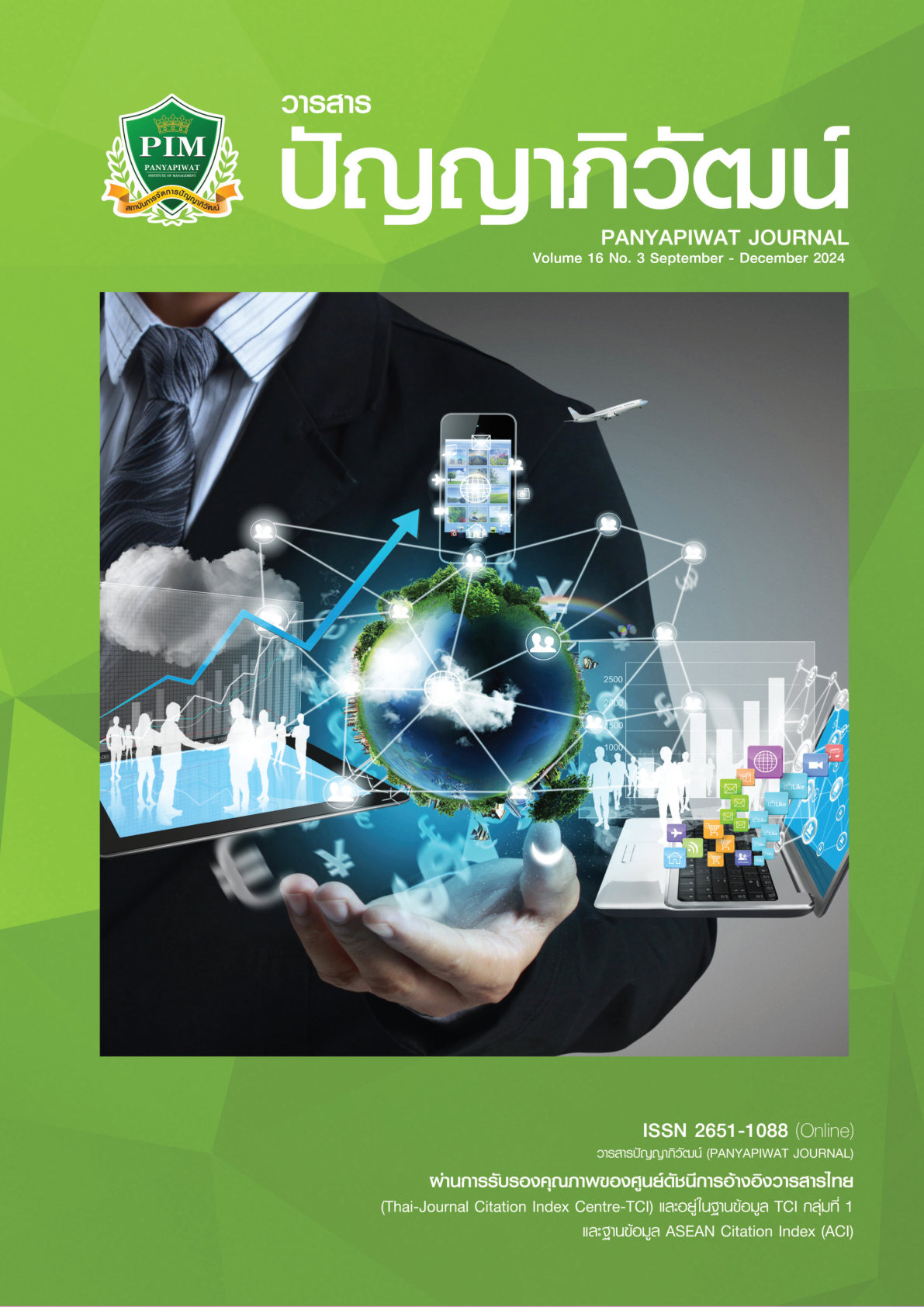การพัฒนาหลักสูตรเตรียมความพร้อมความสามารถในการเลือกใช้สื่อเทคโนโลยี ของนักศึกษาครูเพื่อสนับสนุนการเรียนรู้ออนไลน์สำหรับเด็กปฐมวัย
Main Article Content
บทคัดย่อ
งานวิจัยนี้มีวัตถุประสงค์เพื่อพัฒนาและศึกษาประสิทธิผลของหลักสูตรเตรียมความพร้อมความสามารถในการเลือกใช้สื่อเทคโนโลยีของนักศึกษาครูเพื่อสนับสนุนการเรียนรู้ออนไลน์สำหรับเด็กปฐมวัยกลุ่มเป้าหมายที่ใช้ในการศึกษาประสิทธิผลของหลักสูตรที่พัฒนาขึ้นคือ นักศึกษาวิชาชีพครู สาขาการศึกษาปฐมวัยจำนวน 96 คน โดยวิธีการคัดเลือกแบบอาสาสมัคร (Voluntary Selection) เครื่องมือที่ใช้ในการวิจัยคือ 1) หลักสูตรเตรียมความพร้อมความสามารถในการเลือกใช้สื่อเทคโนโลยีของนักศึกษาครูเพื่อสนับสนุนการเรียนรู้ออนไลน์สำหรับเด็กปฐมวัย 2) แบบสัมภาษณ์แบบมีโครงสร้าง 3) แบบบันทึกการวิพากษ์หลักสูตรฯ 4) แบบบันทึกการสังเกตพฤติกรรมการเรียนรู้ในการทดลองนำร่อง 5) แบบทดสอบการเลือกใช้สื่อสำหรับเด็กปฐมวัย พร้อมเกณฑ์การประเมินแบบรูบริก และ 6) แบบประเมินความพึงพอใจที่มีต่อภาพรวมของหลักสูตร และการนำองค์ความรู้ไปใช้วิเคราะห์ข้อมูลเชิงปริมาณโดยการหาค่าสถิติ ได้แก่ ค่าเฉลี่ย ส่วนเบี่ยงเบนมาตรฐานและการทดสอบค่าที วิเคราะห์ข้อมูลเชิงคุณภาพโดยการวิเคราะห์เนื้อหา (Content Analysis)
ผลการวิจัยพบว่า หลักสูตรที่พัฒนาขึ้นประกอบด้วยองค์ประกอบหลัก 5 องค์ประกอบ ได้แก่ 1) จุดมุ่งหมายของหลักสูตร 2) เนื้อหาและโครงสร้างหลักสูตร 3) กระบวนการกิจกรรมการเรียนรู้ของหลักสูตร 4) การวัดและประเมินผลของหลักสูตร และ 5) คู่มือการใช้หลักสูตรฯ โดยหัวข้อเนื้อหาการอบรมมีจำนวน 3 หัวข้อ ได้แก่ กิจกรรมที่ 1 The ASSURE กับการเลือกใช้สื่อปฐมวัย กิจกรรมที่ 2 สนุกทุกที่กับลูสพารตส์และกิจกรรมที่ 3 นิทานแสนสนุกกับคุณครูอวตาร มีหลักการอันเป็นองค์ความรู้สำคัญที่ถูกถ่ายทอดจำนวน 5 ประการ โดยเมื่อทดลองใช้หลักสูตรกับกลุ่มเป้าหมายพบว่า ความสามารถในการเลือกใช้สื่อเทคโนโลยีของนักศึกษาครูเพื่อสนับสนุนการเรียนรู้ออนไลน์ของเด็กปฐมวัยของกลุ่มเป้าหมายมีค่าเฉลี่ยภาพรวมที่ 86.58 ซึ่งสูงกว่าเกณฑ์ร้อยละ 80 อย่างมีนัยสำคัญทางสถิติที่ระดับ .05 และมีความพึงพอใจที่มีต่อภาพรวมของหลักสูตร และการนำองค์ความรู้ไปใช้อยู่ในระดับมากที่สุด
Article Details

อนุญาตภายใต้เงื่อนไข Creative Commons Attribution-NonCommercial-NoDerivatives 4.0 International License.
“ข้าพเจ้าและผู้เขียนร่วม (ถ้ามี) ขอรับรองว่า บทความที่เสนอมานี้ยังไม่เคยได้รับการตีพิมพ์และไม่ได้อยู่ระหว่างกระบวนการพิจารณาลงตีพิมพ์ในวารสารหรือแหล่งเผยแพร่อื่นใด ข้าพเจ้าและผู้เขียนร่วมยอมรับหลักเกณฑ์การพิจารณาต้นฉบับ ทั้งยินยอมให้กองบรรณาธิการมีสิทธิ์พิจารณาและตรวจแก้ต้นฉบับได้ตามที่เห็นสมควร พร้อมนี้ขอมอบลิขสิทธิ์บทความที่ได้รับการตีพิมพ์ให้แก่สถาบันการจัดการปัญญาภิวัฒน์หากมีการฟ้องร้องเรื่องการละเมิดลิขสิทธิ์เกี่ยวกับภาพ กราฟ ข้อความส่วนใดส่วนหนึ่งและ/หรือข้อคิดเห็นที่ปรากฏในบทความข้าพเจ้าและผู้เขียนร่วมยินยอมรับผิดชอบแต่เพียงฝ่ายเดียว”
เอกสารอ้างอิง
Al Lily, A. E., Ismail, A. F., Abunasser, F. M., Alqahtani, H., & Watfa, M. K. (2020). Distance education as a response to pandemics: Coronavirus and Arab culture. Technology in Society, 63, 1-11. https://doi.org/10.1016/j.techsoc.2020.101317
Al-Khattat, S. H., Habeeb, R. R., & Mohammed, A. R. (2019). An ASSURE-model instructional design based on acti Al-Khattat e learning strategies and its effect for 1st intermediate student’s higher order thinking skills in teaching science text book. Psihologija, 52(5), 339-349.
Altin, M. (2021). Evaluation of the effectiveness of English instruction based on ASSURE model. E-International Journal of Educational Research, 5(12), 195-211. https://doi.org/10.19160/e-ijer.1018149
Brown, A., & Green, T. (2021). Parent and teacher collaboration in online learning for early childhood education. Journal of Early Childhood Research, 19(3), 287-302.
Chong, S. (2009). Critical reflection: A framework for reflecting on learning and professional development in pre-service teacher education. National Institute of Education.
Darling-Hammond, L., & Bransford, J. (2005). Preparing teachers for a changing world: What teachers should learn and be able to do. Jossey-Bass.
Drexel Online. (n.d.). A brief history of distance education and learning. https://www.online.drexel.edu/
Heinich, R., Molenda, M., Russell, J. D., & Smaldino, S. E. (1996). Instructional media and technologies for learning (5th ed.). Prentice Hall.
Jones, M., & Park, S. (2021). Engaging young learners in online environments: Practical strategies and examples. Early Childhood Education Journal, 49, 129-140.
Joyce, B., & Showers, B. (2002). Student achievement through staff development. ASCD. JSTOR Daily. (n.d.). The long history of online learning. https://daily.jstor.org/the-long-historyof-online-learning/
Kim, J., & Smith, E. (2021). Designing effective online learning experiences for young children: Best practices and strategies. Journal of Digital Learning in Teacher Education, 37(2), 91-102.
Kincheloe, J. L., McLaren, P., & Steinberg, S. R. (2011). Critical pedagogy and qualitative research: Moving to the bricolage. In N. K. Denzin, & Y. S. Lincoln (Eds.), The SAGE handbook of qualitative research (pp. 163-177). SAGE Publications.
Kolb, D. A. (1984). Experiential learning: Experience as the source of learning and development. Prentice Hall.
Kuczynski, L., & Navarro, P. (2021). Teaching, learning, and assessment in early childhood education: Lessons from COVID-19. Early Childhood Education Journal, 49(1), 141-148. https://doi.org/10.1007/s10643-020-01110-y
Larkin, K., & Jelley, R. P. (2020). Exploring preservice teachers’ perceptions of technology integration in the classroom. Journal of Digital Learning in Teacher Education, 36(3), 139-150.
Liu, X., Kang, J., & McLeod, J. (2020). The role of interactive media in early childhood education: A review of the literature. Early Childhood Research Quarterly, 50, 180-190.
Mishra, P., & Koehler, M. J. (2020). Technological Pedagogical Content Knowledge (TPACK): The past 30 years and beyond. Journal of Educational Computing Research, 57(8), 1801-1819.
Noe, R. A. (2017). Employee training and development. McGraw-Hill Education.
Office of the National Education Commission. (2010). National Education Act B.E. 2542 (1999) and its amendments (3rd ed.) B.E. 2553. Prime Minister’s Office.
Oliva, P. F. (2009). Developing the curriculum (7th ed.). Allyn and Bacon.
Panakul, S. (2013). Development and evaluation of social studies curriculum. Ramkhamhaeng University Press. [in Thai]
Piaget, J. (1952). The origins of intelligence in children. International Universities Press.
Pinto, C. A., Sousa, C. D., & Vasconcelos, T. M. (2021). Distance learning in early childhood education during COVID-19: Challenges and opportunities. European Early Childhood Education Research Journal. Advance online publication.
Ritjaroon, P. (2015). Curriculum evaluation: Concepts, processes, and utilization of evaluation results. STOU Journal of Education, 7(1), 13-21. [in Thai]
Ruff, H. A., & Capozzoli, M. C. (2003). Development of attention and distractibility in the first 4 years of life. Developmental Psychology, 39(5), 877-890. https://doi.org/10.1037/0012-1649.39.5.877
Taba, H. (1962). Curriculum development: Theory and practice. Brace & World.
Tyler, R. W. (1949). Basic principles of curriculum and instruction. University of Chicago Press.
Utranan, S. (2012). Basic principles and curriculum development. Mitrasiam. [in Thai]
Veiga, G., Neto, C., Almeida, A., & Fernandes, F. (2021). Early childhood education in the pandemic: Teaching and learning experiences mediated by digital technologies. Early Child Development and Care, 191(11-12), 1885-1895.
Yaemkhayai, C. (2023a). Development of instructional model based on engineering design process principles and 360-degree feedback approaches to enhance creative problem-solving abilities of pre-service teachers. URU Journal of Integrated Sciences for Development, 13(2), 1-18. [in Thai]
Yaemkhayai, C. (2023b). Development of workshop training curriculum to enhance the ability of active learning management design by using challenge-based learning with gamification approach for pre-service teachers. Panyapiwat Journal, 15(3), 253-272. [in Thai]


